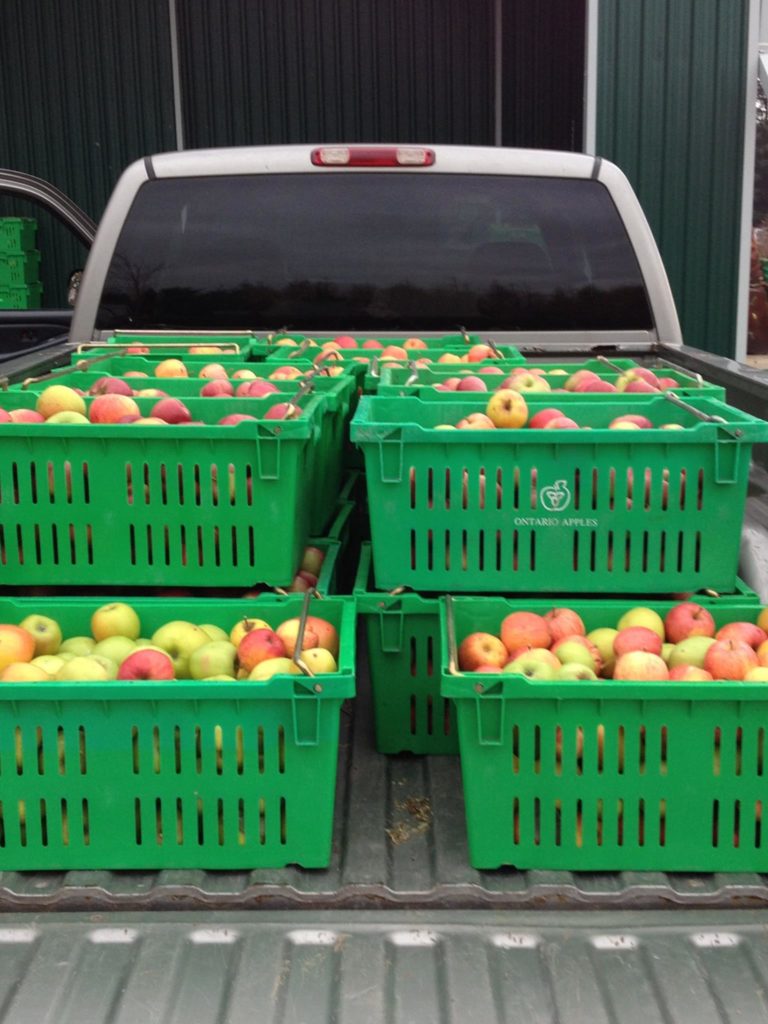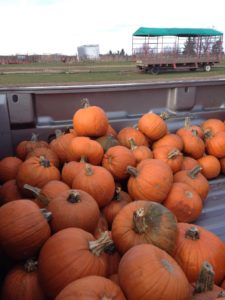Giving monthly is a convenient way to nourish neighbours throughout the year. And all monthly gifts will be matched for 2x the impact! Learn more.
 Known as one of Ontario’s diverse and abundant agricultural areas, Halton is home to many farms that grow good, nutritious food. However, until recently, Food for Life and our partners had no efficient system to get produce and meat from local farmers into the fridges of those who need it most.
Known as one of Ontario’s diverse and abundant agricultural areas, Halton is home to many farms that grow good, nutritious food. However, until recently, Food for Life and our partners had no efficient system to get produce and meat from local farmers into the fridges of those who need it most.
In 2013, we were integral to creating Feeding Halton, an innovative inter-agency partnership between Halton’s agricultural community, social service agencies, and Halton Region. It was launched the following year to procure fresh produce from local farmers and distribute it to our friends and neighbours throughout Halton, reducing barriers for farmers who had food to give but were unaware of the need
“Farmers had no idea how many people were in need of food in Halton,” says Nancy Comber, Chair of the Steering Committee at Feeding Halton, who says that excess food was going into compost. “Even today, when I attend the meeting of the Halton Region Federation of Agriculture and talk about the people who are being fed or need to be fed, they’re absolutely amazed that in a community such as Halton, that is recognized as a ‘have’ community, there are so many that are struggling,” she says.
Launched with support from the Greenbelt Fund and funding from the Ontario government, Feeding Halton helps farmers and agencies to work collaboratively, providing equitable food access to Halton’s growing and changing population. Feeding Halton is a single contact between agencies and the agriculture community, allocating donations, and simplifying the donation process. It also provides agencies with below-cost purchasing power to access grade and non-grade produce from farmers that might otherwise go to waste.
“Food for Life has always been an integral partner in the Feeding Halton organization,” says Comber. Since the collective began, we’ve provided operation space and access to refrigerated trucks. “Because of the resources that Food for Life has, they have received a lot of the donated food and disseminated it into the community. They have been a great collaborative partner at the table working with us.”
One of the success stories of Feeding Halton has been building long-term relationships, not simply one-off donations.
“At the very cusp of starting with Feeding Halton, I had a local farmer approach me,” says Comber. “He said, ‘Nancy, I have all this sweet corn left over. Do you know of anyone who could take it?’ They’ve been donating sweet corn every year,” she says, adding that they donate a crate or two every week during sweet corn season.
Feeding Halton is not only committed to getting food to those who need it; they’re committed to getting high-quality, healthy, local food to those who need it.
There’s a benefit in knowing, and feeling comfortable, where your food comes from,” says Comber. “I don’t think, as Canadians, we realize how much food does get transported from around the world. They say, a tomato ripened on the vine has so many more vitamins and goodness in it compared to a tomato that was picked not quite ripe, but ripened on the truck.
Nancy Comber
 “There’s a benefit in knowing, and feeling comfortable, where your food comes from,” says Comber. “I don’t think, as Canadians, we realize how much food does get transported from around the world. They say, a tomato ripened on the vine has so many more vitamins and goodness in it compared to a tomato that was picked not quite ripe, but ripened on the truck.” She also notes that supporting local food industries reduces our environmental impact.
“There’s a benefit in knowing, and feeling comfortable, where your food comes from,” says Comber. “I don’t think, as Canadians, we realize how much food does get transported from around the world. They say, a tomato ripened on the vine has so many more vitamins and goodness in it compared to a tomato that was picked not quite ripe, but ripened on the truck.” She also notes that supporting local food industries reduces our environmental impact.
One recent success story is a partnership Feeding Halton made with Monaghan Mushrooms in Campbellville. “Because restaurants weren’t as open for a fair portion of COVID-19, the demand for mushrooms was down, but the production was still there. They were basically composting a substantial amount” says Comber. “A number of agencies [including Food for Life] have benefited from mushrooms, which, of course, are local and grown year-round. It was just the right connection at the right time.”
Over the years, Feeding Halton has launched several initiatives, including public pop-up markets. However, in recent years, it has “morphed” into an advocacy group. “The social services are advocating the farming community,” says Comber, “making them more aware of the needs. It has opened the minds of farmers in other areas to donate local,” she says of the project’s larger appeal. Comber hopes that shortly Feeding Halton will do more to build resiliency against food insecurity in North Milton.
“When we first got together, it was agreed that one of the best things that could happen to Feeding Halton is that there’s no longer a need to be because we’ve achieved what we intended to achieve, and I believe that’s more local food to local people,” says Comber. “I think we’re coming close to that milestone. We’ve done a great job.”